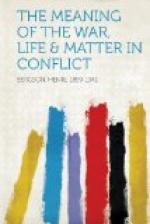of man in order to make his nature material as their
own? What kind of a world would it be if this
mechanism should seize the human race entire, and
if the peoples, instead of raising themselves to a
richer and more harmonious diversity, as
persons
may do, were to fall into the uniformity of
things?
What kind of a society would that be which should
mechanically obey a word of command mechanically transmitted;
which should rule its science and its conscience in
accordance therewith; and which should lose, along
with the sense of justice, the power to discern between
truth and falsehood? What would mankind be when
brute force should hold the place of moral force?
What new barbarism, this time final, would arise from
these conditions to stifle feeling, ideas, and the
whole civilization of which the old barbarism contained
the germ? What would happen, in short, if the
moral effort of humanity should turn in its tracks
at the moment of attaining its goal, and if some diabolical
contrivance should cause it to produce the mechanization
of spirit instead of the spiritualization of matter?
There was a people predestined to try the experiment.
Prussia had been militarized by her kings; Germany
had been militarized by Prussia; a powerful nation
was on the spot marching forward in mechanical order.
Administration and military mechanism were only waiting
to make alliance with industrial mechanism. The
combination once made, a formidable machine would come
into existence. A touch upon the starting-gear
and the other nations would be dragged in the wake
of Germany, subjects to the same movement, prisoners
of the same mechanism. Such would be the meaning
of the war on the day when Germany should decide upon
its declaration.
She decided, he will continue, but the result was
very different from what had been predicted.
For the moral forces, which were to submit to the
forces of matter by their side, suddenly revealed themselves
as creators of material force. A simple idea,
the heroic conception which a small people had formed
of its honour, enabled it to make head against a powerful
empire. At the cry of outraged justice we saw,
moreover, in a nation which till then had trusted in
its fleet, one million, two millions of soldiers suddenly
rise from the earth. A yet greater miracle:
in a nation thought to be mortally divided against
itself all became brothers in the space of a day.
From that moment the issue of the conflict was not
open to doubt. On the one side, there was force
spread out on the surface; on the other, there was
force in the depths. On one side, mechanism,
the manufactured article which cannot repair its own
injuries; on the other, life, the power of creation
which makes and remakes itself at every instant.
On one side, that which uses itself up; on the other,
that which does not use itself up.




